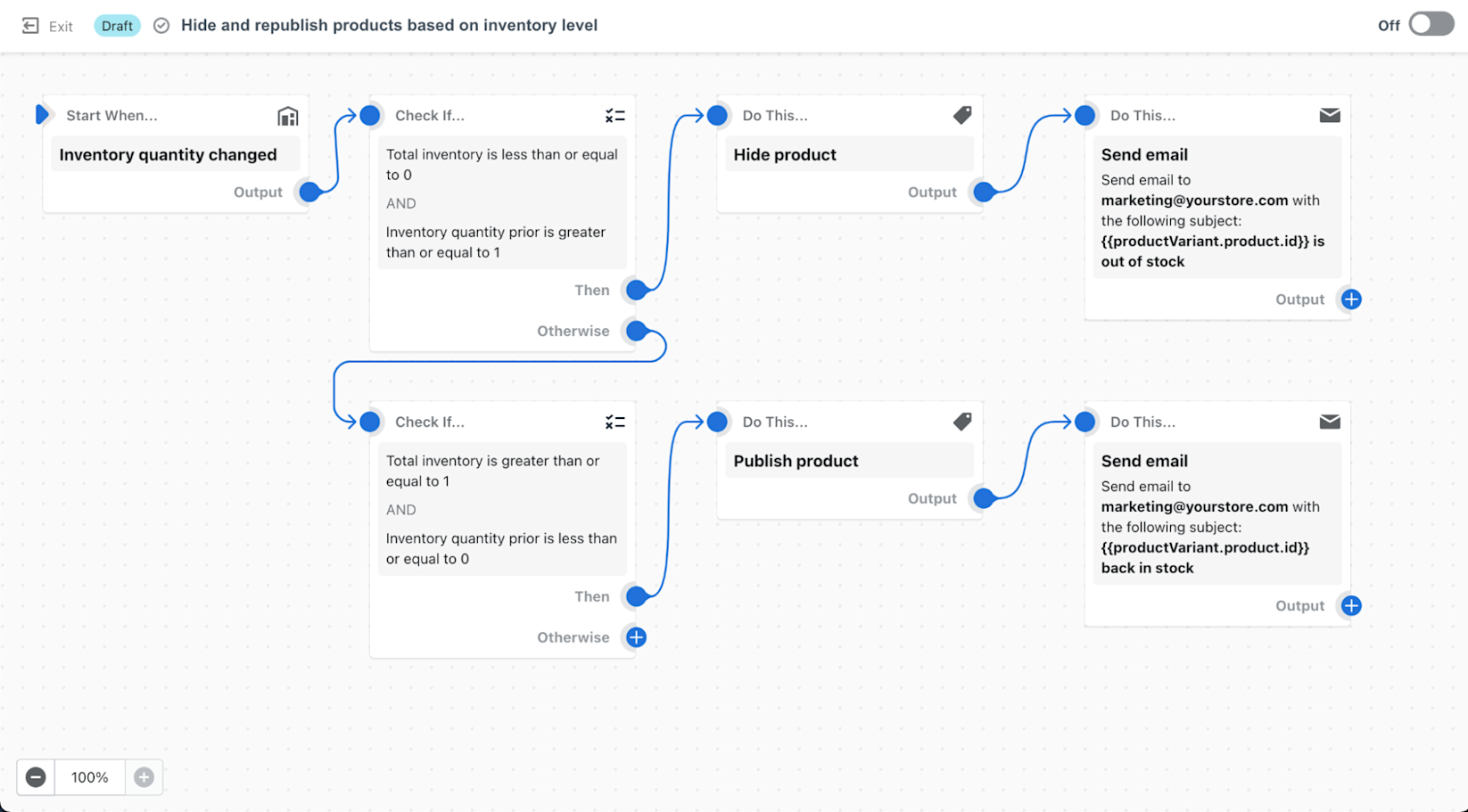Every retailer executes hundreds, if not thousands, of small tasks that take between two and five minutes every day. Individually, they never appear to be a significant time-waster. But together, they devour productivity and stunt growth. Research recommends that rather than focusing on incremental change, focus on improvements that can fundamentally change how your organization operates.
Ecommerce automation is about giving your people and yourself the most important thing you can: time. More than that, it unleashes your teams to invest in high value work in our current climate: retraining staff on new fulfillment processes, crisis communications, working out new deals with suppliers, dealing with HR challenges, experimentation, sales and marketing, and product iteration.
Thousands of online retailers have put ecommerce automation to work with Shopify Plus. Even more impressive are the hard numbers behind those businesses: 1.1 billion workflows/decisions offloaded, each one eliminating a process that used to be manually operated. In total, that’s 9.2 million hours in time saved (or more than 1000 years).
In this post, we’ll take a look at how ecommerce automation can save you time, to streamline costs and focus your attention on what matters.
Table of contents
- What is ecommerce automation?
- Why is automation important in ecommerce?
- Benefits of ecommerce automation
- 5 crucial tasks you can automate
What is ecommerce automation?
Ecommerce automation is the use of technology and software to streamline and automate various tasks and processes in online retail. It includes automating inventory management, order processing, payment processing, customer support, and marketing, resulting in increased efficiency, accuracy, and scalability for ecommerce businesses.
The problem is simple: as a business scales, the demands, complexity, and repetition add up. Systems that used to work become increasingly inefficient and break down. In response, companies turn to time-consuming workarounds—time that could be spent on what’s important is sacrificed for time spent on what’s urgent, even when that’s just pushing buttons.
Or companies turn to new hires. Unfortunately, people don’t scale. But that doesn’t undercut the value of people—if anything, it reinforces it. People, especially their time and energy, are your most powerful resource.
Why is automation important in ecommerce?
As business booms, so too does the demand for resources. And although hiring more people, adding new tools, or increasing workloads might seem like the way forward, automation begs to differ.
Automation offers a simpler, more effective way to do business. By focusing on foundational changes to your processes and workflows, and automating wherever possible, you’ll be able to improve and scale your mission-critical strategies—all without increasing costs.
As you build automation out even further, you’ll start to empower your teams to automate the tedious manual tasks that eat up their time. This will free them up to focus more on the strategic decisions that will propel your business forward.
What’s more, automation will fuel scalability on a whole new level—one that allows you to create completely new capabilities. With these new capabilities, you can tap into new market opportunities or maybe solve a specific problem that’s been holding you back.
For example, chatbots have been on the rise, and for good reason. Businesses all over the world have integrated chatbots to offer 24/7 customer support without needing a human to be available that whole time. As a result, the chatbots take care of the bulk of issues or questions, which in turn liberates support teams to handle more complex or specialized inquiries. Plus, businesses can then handle much higher volumes of inquiries—and offer better support at scale.
Benefits of ecommerce automation
We’ve touched on this a bit already, but let’s delve a bit deeper into a few specific key benefits of ecommerce automation.
1. More employee value and happiness
Zapier reports that 94% of everyday work revolves around repetitive or mundane tasks. For a high-volume ecommerce store, that might look like manually creating shipping labels, checking inventory, or notifying team members about out-of-stock items.
By automating these types of tasks, you can help your employees become more efficient. But more importantly, you’ll empower them to spend their time on the specialized tasks that are worthy of human intelligence. And by doing so, your employees will feel more impactful, happier, and more fulfilled—and they’ll be much more likely to stick around.
2. Fewer errors
Human error is common in high-volume, repetitive tasks. Fortunately, automation can help solve the culprits of fatigue and split concentration. Take our example of monitoring inventory levels. In a high-volume situation, it’s just not practical to expect one person or even a small team to handle such tall orders on tight deadlines without any mistakes or missteps.
Automation, on the other hand, isn’t as prone to clerical or mathematical errors. Automated tasks don’t get tired, and they don’t get bored. They show up equally each time, which ensures these simple but repetitive and critical tasks get done on time. All mistake free.
3. Decreased impact of labor shortages
It goes without saying that you want the best people to power your business. But so does everyone else. As demand rises for talented staff but the pool of available workers shrinks, it can be tough to navigate such a tumultuous situation.
Once again, automation is here to help. You can optimize your current operations and workflows and get the best work out of the employees you already have. This way, you can scale your business with your existing teams rather than navigating labor shortages.
4. Better customer experiences
In the world of ecommerce, every touchpoint can make or break a transaction. By automating key moments like order confirmations, shipping notifications, support inquiries, and more, you can help shoppers feel supported every step of the way.
For example, you could set up automated emails to update customers on when items ship or if they get delayed. Or you could implement a chatbot to take care of customer support 24/7.
5. Increased revenues and reduced costs
Taking all the previous four benefits into consideration, it’s clear that automation has a big impact on the bottom line. By cutting down on costs through automation, the natural result is a boost to your business’s overall revenue. You can amplify your teams’ effectiveness, speed up workflows, optimize processes, fuel productivity, and scale to support more sales and higher delivery numbers. All without adding more costs.
5 crucial tasks you can automate
With these benefits in mind, let’s look at a few ways to tactically apply automation to retail ecommerce.
1. Inventory, orders, and fulfillment
Of all areas in a retail ecommerce business, fulfillment is maybe the one best suited for automation. Whether you want to streamline label creation or follow up after every delivery, automation can make sure it happens the right way every time.
Automation can also take care of other situations to accelerate your business:
- Flag multiple orders from one customer to save shipping costs and improve the customer experience.
- Prevent stockouts or overstocking and keep up with general inventory fluctuations.
- Notify inventory teams or suppliers when an item is out of stock.

2. Customer loyalty
Customer acquisition costs are rising. Which means it’s even more important to foster a loyal customer base and keep them coming back to your business. With automation, you can nurture these relationships, segmenting the highest-value customers through specialized marketing tactics.
For example, you can set up automated tags to give a customer a loyalty shopper tag or access to a higher tier of your loyalty program once they reach a certain spending threshold. Or you could automatically offer tailored incentives or rewards based on a customer’s shopping habits. Essentially, you can automate countless marketing tactics to help support your customer experiences, which in turn will improve customer loyalty.
3. Scheduled sales and product releases
The last thing you want to worry about when launching a sale event is being late to the party. And given that these types of projects typically require collaboration across several teams, it can be stressful to reach the finish line on time.
With automations, people across your web, sales, and marketing teams can plan and strategize in advance, then launch at the exact times they want. For example, you can schedule price changes for specific, predetermined time periods like Black Friday or Cyber Monday. Or you could preload new products into your site on the back end, and then publish automatically when your sale goes live.
4. Customer support
We’ve touched on this a bit already, but automated support can be key to keeping your customers around for the long haul. Especially since shoppers expect always-on support and fast communication.
So whether you’re using chatbots or other automated customer communications workflows, automation will ensure the support processes are always streamlined and as fast as possible. Chatbots can handle the everyday questions, emails can be scheduled to send updates about order confirmations and shipping notifications, and so much more.
5. Rules-based pricing and discounts
As prices fluctuate throughout the entire economic landscape, it’s important to be able to dynamically adjust price offers, discounts, bundle deals, and wholesale rates as needed. And by using automation, you can tie these types of price changes to certain customer profiles powered by data.
For example, you could reward loyal customers with favorable pricing. Or you could adjust pricing or discounts based on member status, order history, and more. However you want to set it up, automation will take care of the rest—and apply them at strategic moments to encourage higher conversion.
Save time with automation—powered by Shopify
Any business can benefit from building automation into its workflows. Critical but resource-intensive tasks can get done fast, and your employees can feel empowered to be more strategic. All in the service of your bottom line.
If you’re ready to start streamlining your costs and getting value for your platform investment, get in touch with us today.
Ecommerce Automation FAQ
What is an example of ecommerce automation?
Generally speaking, some examples of ecommerce automation include tracking inventory and triggering reorders when stock is low, automatically fulfilling orders, or sending automated marketing emails to customers. But one specific example of ecommerce automation would be a large electronics retailer using it to power its big Black Friday sale. Automation would help the brand stay on top of current inventory numbers and provide real-time inventory updates to customers. That way, customers would know exactly how many items are left in stock before they make a purchase, or else they’ll know if a product is out of stock altogether.
How do I start a successful automated ecommerce business?
As is true when starting any business, you’ll need to do plenty of research and planning beforehand. This includes defining your niche and your target market, and then selecting profitable products that will resonate with your customers. Then you’ll need to select and set up your ecommerce platform, ideally one that’s user-friendly and scalable. That way, you can quickly grow as your business does. Finally, you’ll need to research and select the automation tools that will work best for your needs and platform to take care of the repetitive tasks across your business.
How does automation help ecommerce?
In general, automation helps ecommerce businesses boost efficiency, improve customer experiences, and increase sales. By automating repetitive tasks, businesses can reduce human error and speed up their processes. Automation also makes it possible to provide 24/7 support and much more personalized communication with customers, while improving order fulfillment accuracy and speed. Finally, because automation can optimize pricing and promotions, retarget abandoned carts, and identify cross-sell or upsell opportunities, it can also play a major role in sales initiatives.
Read More
- Consumer Psychology: Sell to the Person Behind the Persona
- How I Raised $1.1 Million Without a Network or Experience
- The Dirty Little Secret Traditional Enterprise Software Companies Don't Want You Knowing
- Stop Trying to Increase Your Conversion Rates
- Back-to-School Ecommerce: Infographic & Lessons from $58.1B in Online Sales
- Ecommerce Customer Service: Holiday Insights Direct from 10 Industry Leaders
- Artificial Intelligence: Armageddon or Nirvana? Experts Predict What Happens Next






